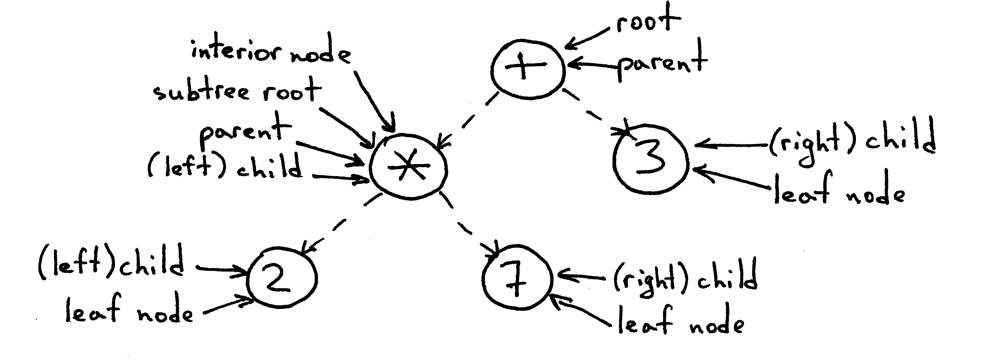Write your own compiler - Station #2: the parser (original) (raw)
The plan
Our journey is made of 4 stations - each of them depending on the previous ones:
- The tokenizer (aka “Lexical Analysis”): converting an input code - in
LISPsyntax - into an array of tokens. - The parser (aka “Syntactic Analysis”): transforming an array of tokens into an Abstract Syntax Tree (AST).
- The emitter (aka “Code Generation”): string-ifying an AST into
C-like code. - The compiler (aka “You made it”): combining all the pieces together.
(The interactive code snippets are powered by a tool of mine named KLIPSE.)
Our parser is going to take an array of tokens and turn it into an Abstract Syntax Tree (an AST).
An array like this:
[{ type: 'paren', value: '(' }, ...]
should become a tree like that:
{ type: 'Program', body: [...] }


Code organization
Our code is going to be organized this way:
parseProgram: receives an array of tokens and return aProgramnode with abody- callingparseTokenparseToken: receives a single token and according to its type calls eitherparseNumber,parseStringorparseExpressionparseNumber: receives a token and returns aNumbernodeparseStringreceives a token and returns aStringnodeparseExpression: receives a token and returns anExpressionnode - callingparseTokenrecursively
Each parser (except parseProgram) returns an array with:
- the updated current position
- the parsed node
Number and String parsers
Number and String parsing is really straightforward:
parseNumber = (tokens, current) => [current + 1,
{type: 'NumberLiteral',
value: tokens[current].value,
}]
parseNumber([{
"type": "number",
"value": "42",
}], 0)
parseString = (tokens, current) => [current + 1,
{type: 'StringLiteral',
value: tokens[current].value,
}]
parseString([{
"type": "string",
"value": "Hello World!",
}], 0)
Expression parsing
Parsing an expression is much trickier because expressions can be nested like (add 1 (subtract 3 2)).
No worries: javascript supports recursions!!!
The code of parseExpression is going to:
- Skip the first token - it is the opening parenthesis
- Create a base node with the type
CallExpression, and name from the current token - Recursivelly call
parseTokenuntil we encounter a closing parenthesis - Skip the last token - it is the closing parenthesis
Not so complicated. Right?
Here is the code:
parseExpression = (tokens, current) => {
let token = tokens[++current];
let node = {
type: 'CallExpression',
name: token.value,
params: [],
};
token = tokens[++current];
while (!(token.type === 'paren' && token.value ===')')) {
[current, param] = parseToken(tokens, current);
node.params.push(param);
token = tokens[current];
}
current++;
return [current, node];
}
Unfortunately, we cannot test parseExpression until we implement parseToken (because of the recursion)…
Token parsing
The code of parseToken is really simple, calls the parser that corresponds to the token type:
parseToken = (tokens, current) => {
let token = tokens[current];
if (token.type === 'number') {
return parseNumber(tokens, current);
}
if (token.type === 'string') {
return parseString(tokens, current);
}
if (token.type === 'paren' && token.value === '(') {
return parseExpression(tokens, current);
}
throw new TypeError(token.type);
}
Let’s test parseExpression - first with a simple expression:
const tokens = [
{ type: 'paren', value: '(' },
{ type: 'name', value: 'subtract' },
{ type: 'number', value: '4' },
{ type: 'number', value: '2' },
{ type: 'paren', value: ')' },
]
parseExpression(tokens, 0)
And now - with a nested expression:
const tokens = [
{ type: 'paren', value: '(' },
{ type: 'name', value: 'add' },
{ type: 'number', value: '2' },
{ type: 'paren', value: '(' },
{ type: 'name', value: 'subtract' },
{ type: 'number', value: '4' },
{ type: 'number', value: '2' },
{ type: 'paren', value: ')' },
{ type: 'paren', value: ')' },
]
parseExpression(tokens, 3)
Program parsing
A program is composed by a series of expressions, therefore parseProgram is going to call parseToken until all the tokens are parsed:
function parseProgram(tokens) {
let current = 0;
let ast = {
type: 'Program',
body: [],
};
let node = null;
while (current < tokens.length) {
[current, node] = parseToken(tokens, current);
ast.body.push(node);
}
return ast;
}
Let’s give parseProgram a nickname:
parser = parseProgram
Let’s test parseProgram:
const tokens = [
{ type: 'paren', value: '(' },
{ type: 'name', value: 'print' },
{ type: 'string', value: 'Hello' },
{ type: 'number', value: '2' },
{ type: 'paren', value: ')' },
{ type: 'paren', value: '(' },
{ type: 'name', value: 'add' },
{ type: 'number', value: '2' },
{ type: 'paren', value: '(' },
{ type: 'name', value: 'subtract' },
{ type: 'number', value: '4' },
{ type: 'number', value: '2' },
{ type: 'paren', value: ')' },
{ type: 'paren', value: ')' },
]
parseProgram(tokens, 0)
You did it! You have written a parser for our Lisp-like language…
Please take a short rest before moving towards Station #3: The emitter.